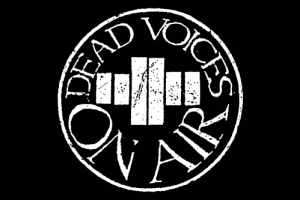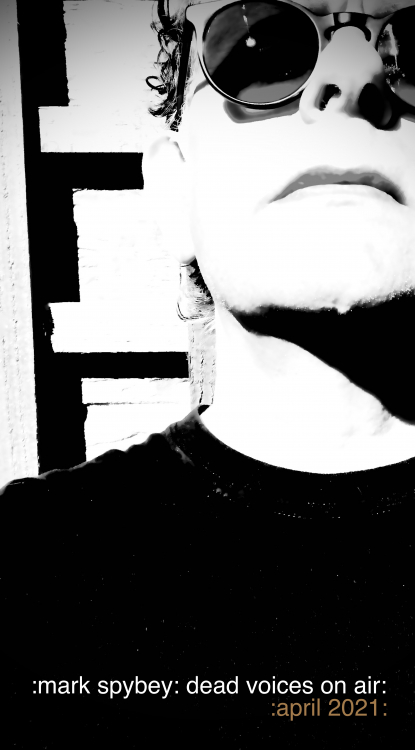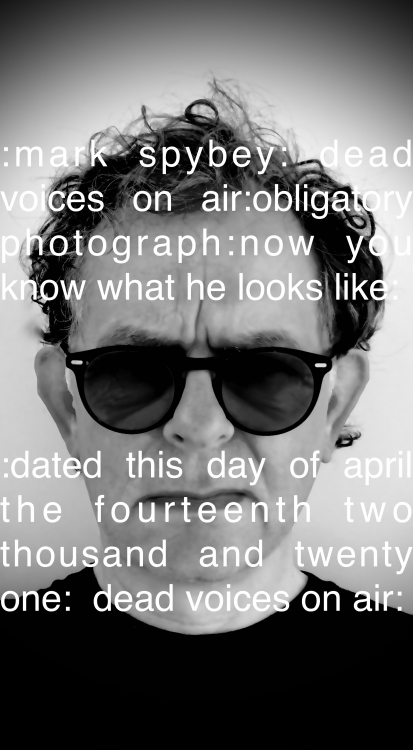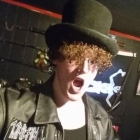
Hello Spybey and welcome to Brutal Resonance! Let’s start off with a warm-up question, one that I always love to ask. What are three of your favorite albums of all time and why?
Spybey: "Tago Mago" by CAN. Why? Because it is entirely perfect and blissfully flawed. I can always find something new in it and that is after living with it for over forty years.
"Hex Induction Hour" by The Fall. Why? Well my top ten albums would invariably include at least one album by The Fall and this is my favourite I think. It is epic, bristling with northern English anguish, humour and rage.
"Jack Johnson" by Miles Davis. Why? I could have chosen half a dozen albums from Miles’ electric phase so I chose "Jack Johnson" out of the hat really. The absolute master of measured interjection, he knew exactly when to play and more importantly, when to stop playing. A colossus. I love Miles’ funk phase.
Let’s go back nearly thirty years. You’ve been working under the Dead Voices On Air name for quite a while. Where did it all begin? Where did you get the idea for the project?
Where does the name Dead Voices On Air stem from? I always interpreted it as being bands who are played on the radio, whose members might have already past into the afterlife.
You’ve appeared in dozens upon dozens of albums and have collaborated with so many other musicians in the past. Tell me, what are some of the highlights in your career? Does being an original member of Download trump it all or are there other memories that inhabit a more special place?
Whilst I am very proud of my work with Download, and very grateful to cEvin and everyone involved, as a teenage fan of the band CAN, my most memorable collaboration is the work that I did with Michael Karoli who was CAN’s guitarist. I suspect that he could have invited pretty much anyone to be part of his band and I sincerely doubt that many people would have turned down that opportunity. But he didn’t ask anyone, he asked me. It was accidental I think rather than by design but that’s cool too! To rehearse with him and to play over a dozen shows with him was very special. To be part of CAN’s thirtieth anniversary concerts was an honour and a privilege. He very sadly passed away nearly twenty years ago. I have my Manager at the time Thomas Ziegler to thank for opening those doors for me. I recognise that Download did do something at the time, that was special. At least I felt it was special, so yes that project does occupy an important place in my heart. I felt so very proud to be able to play live with cEvin and Phil between 2010 and 2011, some thirteen years after I had departed the band.

Coming all the way into the present, then, you have a new album coming out with Snowbeasts. Where did you meet them and how did this project take off?
I didn’t set out though to do a split CD with them, I started to collaborate with several people, at the same time: Marco from Argentina, Lori from Utah, Anatoly from Moscow and Rob and Beth from RI. I ended up with two albums and felt that the material with Rob and Beth probably benefitted by being on one CD. I felt it was right to co-credit the album to Snowbeasts and DVOA. The other album is finished and in the queue to be released on CD.
When I read the press release, your words had quite a philosophical approach to collaborations. Can you tell us how you view collaborations with other artists and how they should work?
Secondly, it is really important to respect the contribution of others. I am a bit of a bugger for changing things quite radically but I tend to go with the flow: I hear sounds in sounds and have a feel for where I might like to take them. If I think the piece must benefit from some vocals I tend to improvise vocals and then refine them. I often go for first takes, as I think they can capture the essence of intention. I do edit, sometimes over edit but I never fuss over work.
I consider myself to be an improviser and I learnt my trade improvising with others. I use the cycling analogy: I have put in the miles. So I value listening as much as playing and not playing as much as playing. I also never try to offend nor scare people. If people feel scared or offended, then it’s not by intention. At the end of the day an album is just a collection of ideas. It’s not definitive. For me collaboration is about the process and not the product. I can’t work with anyone, willy nilly. I do need to feel a connection and I think projects do take a bit of scoping out. It might be that the hard work is done before you start to make music together.

The cover art was assembled by Marco Roberti. Tell us about your relationship with Marco Roberti and what photos were used when assembling the artwork.
The photos for the CD are merged images of seascapes, taken by Rob and Beth in RI of the Atlantic and by myself, of the North Sea in Yorkshire. Beth has also made a couple of videos using the same approach, merging images from the two locations. You can find them HERE.
Out of the six songs on the album, which one is your favorite and why?
Following this release, what else do you have in store for 2021? You are a busy musician, I can imagine. Do you have any albums, EPs, single, remixes, etc. in the works?
Lastly, I would like to thank you for your time. I wish you the best of luck and leave the space below for you to mention anything you wish. Cheers!
This interview was commissioned through our Ko-fi page.
May 15 2021
Every aspect of Interlace is a reflection of the outside world in one way or the other.
Interlace, Jan 01 2004

Steven Gullotta
info@brutalresonance.comI've been writing for Brutal Resonance since November of 2012 and now serve as the editor-in-chief. I love the dark electronic underground and usually have too much to listen to at once but I love it. I am also an editor at Aggressive Deprivation, a digital/physical magazine since March of 2016. I support the scene as much as I can from my humble laptop.
Share this interview
Facebook
Twitter
Google+
Shares
Popular interviews
Psyclon Nine
Interview, Mar 24 2017
Night Runner
Interview, Oct 13 2016
Testube
Interview, Apr 02 2022
Kite
Interview, Feb 10 2017
God Destruction
Interview, May 17 2016
Related articles
Various Artists - 'Net.Ware Twist of Fate'
Review, Sep 19 2009
ESC - 'Eight Thousand Square Feet'
Review, Jun 02 2010
Namesis & Corvad
Interview, Jul 27 2021
Project Pitchfork - 'Black'
Review, Mar 29 2013
Hidden Place - 'Weather Station - Early Works'
Review, Jun 13 2011



